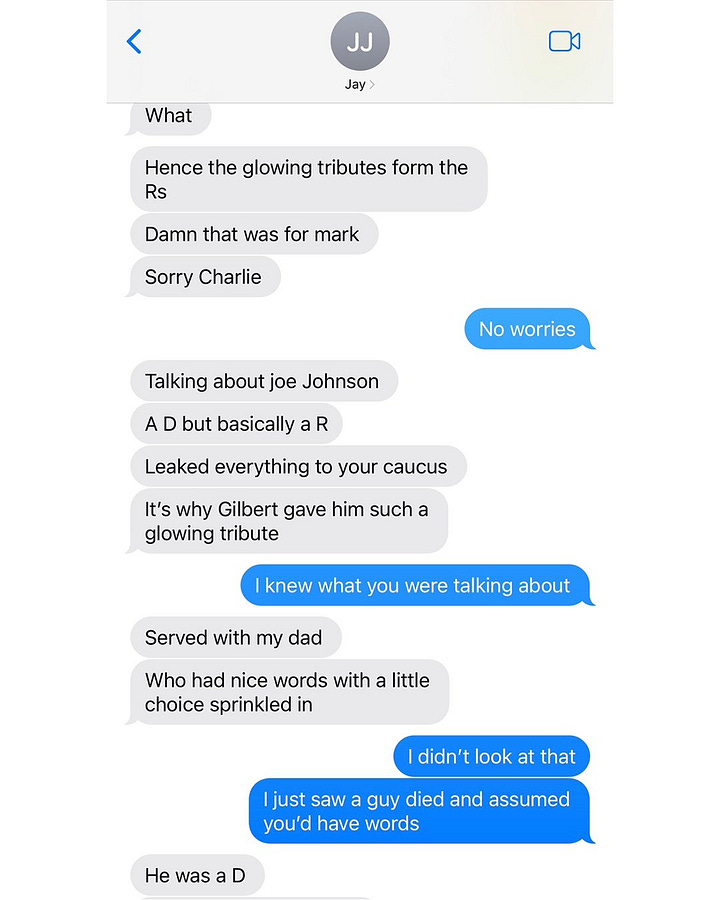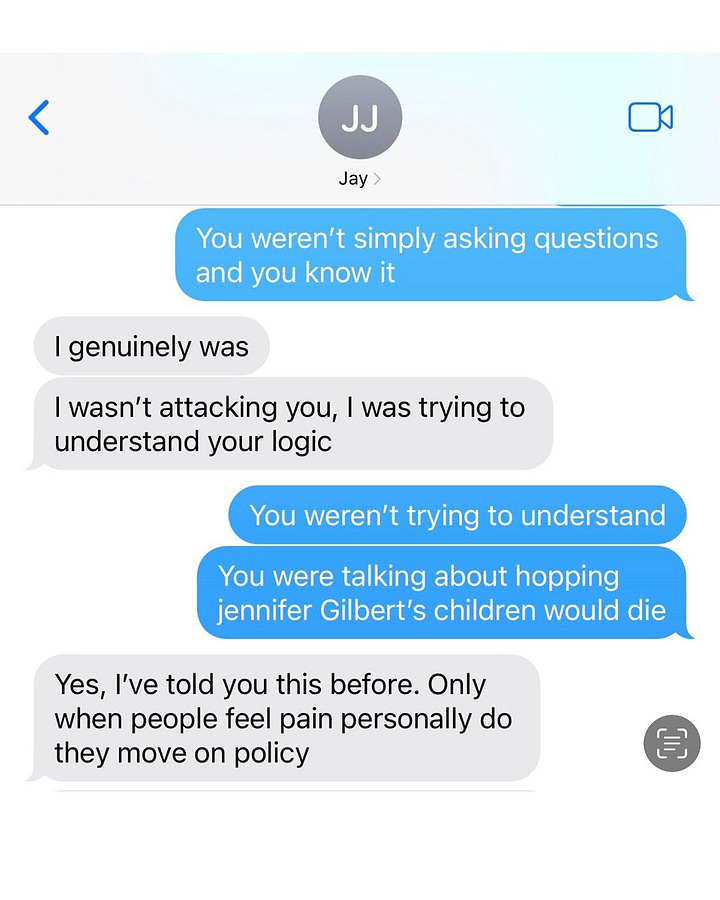The Democrats' Jay Jones Problem and Permission for Violence
The violence comes from the few. The permission structure is built by the many.
Have you heard about Virginia’s Democratic Attorney General candidate, Jay Jones, and his text messages that fantasized about the murderer of a sitting Republican House Speaker and his family?
Let me break it down for you.
"Three people, two bullets / Gilbert, hitler, and pol pot / Gilbert gets two bullets to the head."




This is a common joke or sentiment when being hyperbolic about someone you hate, but it’s what Jones did afterward that exposes Jones’ true sentiments.
After Republican Delegate Carrie Coyner responded, "Jay- Please stop," Jones doubled down with a phone call. He told her he wished Todd Gilbert’s wife, Jennifer, could watch their own child die in her arms, to force Gilbert to reconsider his views on gun policy.
When Coyner, disgusted, hung up, Jones texted again: "I mean do I think Todd and Jennifer are evil? And that they’re breeding little fascists? Yes." Sound familiar?
These texts weren’t from some anonymous troll from behind a keyboard. They came from Virginia’s Democratic nominee for Attorney General, a man who could be the state’s top law enforcement officer. Is any Republican or conservative expected to feel safe in the state of Virginia if Jones becomes the top law enforcement officer?
National Review broke the story on October 3rd. Jones apologized. But here’s what didn’t happen: not one prominent Democratic leader called for him to withdraw from the race.
His running mates, Abigail Spanberger and Ghazala Hashmi, condemned his "rhetoric" via press releases but stopped short of asking him to step aside. No statements from the national Democratic leadership demanding accountability. No widespread media coverage treating this as the disqualifying event it obviously is.
Instead, we got something else entirely: excuse-making.
But Wait—There’s More
Just when you thought the story couldn’t get worse, it did.
Further reporting revealed that the 2022 texts weren’t Jones’s first venture into violent political fantasy. Back in 2020, during a heated conversation with Coyner about qualified immunity for police officers, Jones allegedly made another chilling statement.
According to Coyner, Jones argued that removing qualified immunity protections would change police behavior. When she pushed back, warning that officers would get killed if they had to second-guess split-second decisions, Jones responded: "Well, maybe if a few of them died, that they would move on, not shooting people, not killing people."
Coyner described his comment as "insane." She told him that such a policy would put both officers and the public at risk. But Jones, who later sponsored legislation to end qualified immunity, stood his ground.
When confronted about this 2020 conversation, Jones denied it, claiming through a spokesperson: "I did not say this. I have never believed and do not believe that any harm should come to law enforcement, period."
Here’s the problem with that denial. We now know Jones is comfortable fantasizing about political violence in private conversations. We have the receipts from 2022. We know he thought he was texting someone sympathetic when he sent those messages to "Mark" (likely Delegate Mark Levine), but accidentally texted Coyner instead. We know that when challenged, he doubled down rather than backing off.
So when Jones says he never expressed similar sentiments about police officers in 2020, why should anyone believe him? Especially when the person making the allegation is the same Republican delegate who saved the 2022 texts and forwarded them to Todd Gilbert for his safety?
Support my work on Substack and unlock full access to all my articles
The Pattern Is the Point
This isn’t about one bad text exchange anymore. It’s about a pattern of violent ideation spanning at least two years, involving two different groups—Republican legislators and police officers. Both times, Jones allegedly expressed the view that people dying would be an acceptable price for advancing his political goals.
Let that sink in.
In 2020: "Maybe if a few police officers died, they would move on policy."
In 2022: Todd Gilbert should get "two bullets to the head," and his wife should watch their child die.
This is what normalized political violence looks like from the inside. It’s not dramatic. It’s not cinematic. It’s a rising Democratic politician casually suggesting that his opponents’ deaths might be politically useful, in private conversations where he thinks he’s among friends.
And here’s what makes it even more disturbing: Jones initially misdirected the 2022 texts. He thought he was messaging Mark, someone who would be sympathetic to his cause. When he accidentally texted a Republican colleague instead and got challenged, he doubled down. He called to explain and justify his position. He sent follow-up texts defending his belief that only personal pain moves people on policy.
This wasn’t a momentary lapse in judgment. This was Jay Jones being honest about what he actually believes.
The Defense Machine Kicks In
The pattern is predictable by now. When faced with violent rhetoric or actions from their own side, Democrats and their media allies deploy a familiar playbook:
Minimize the severity. It was just texts. He wasn’t serious. It was three years ago. He apologized.
Both-sides the issue. Sure, Jones fantasized about shooting a Republican in the head and wanted his wife to watch their child die, but what about Republican rhetoric? Trump says crazy stuff all the time!
Question the timing. Why are we re-litigating old texts when there are more important issues?
Protect the candidate. Let the voters decide. This is a distraction from the real issues.
Deny the pattern. The 2020 police comments? He says they never happened. Never mind that the same person is reporting both incidents and has proven credibility.
Let’s be clear about what Jones’s texts and reported statements reveal: not a one-time lapse, but a pattern. A detailed fantasy about murdering a political opponent, complete with bullet allocation and follow-up commentary about “breeding little fascists.” Alleged advocacy for police deaths as a policy tool. The phone call and follow-up texts that prove this wasn’t a joke that went too far—it was what Jones actually believed.
And the Democratic Party’s response? Crickets.
The Permission Structure in Action
I’ve been documenting the rise of left-wing political violence for months now. The assassination of Charlie Kirk. The coordinated attacks on ICE facilities. The systematic targeting of Jewish Americans. The Tesla vandalism campaigns. The swatting of conservative commentators.
Each time, I’ve noted the same pattern: the violence itself is committed by a relative few, but it’s enabled by the permissive many. And that’s the real story here.
Jay Jones didn’t act on his violent fantasies. But his texts expose something more insidious than one man’s disturbed thoughts. They reveal how normalized violent ideation has become in progressive political circles. Jones felt comfortable enough to text these fantasies to a colleague. He thought he was messaging Mark, who would be sympathetic. But instead, he accidentally texted a Republican colleague, and when challenged, he doubled down. He felt confident enough to advocate for police deaths in a 2020 policy discussion. He thought others would agree. He expected understanding, not horror.
This is what happens when your entire political ecosystem spends years dehumanizing opponents, when you call them fascists, Nazis, and threats to democracy. When you suggest that opposing you is violence, you make actual violence seem like self-defense. When elected officials like Rep. Dan Goldman declare that Trump "has to be eliminated" and former Vice President Kamala Harris confirms on national television that she believes Trump is a fascist.
Words create worlds. And the world Democrats have created, through their rhetoric, their silence, and their selective outrage, is one where fantasizing about shooting Republicans in the head feels permissible to their candidates for major office.
The Real Problem Isn’t Jones
Here’s what everyone needs to understand: Jay Jones is a symptom, not the disease.
The disease is a Democratic Party and media establishment that has spent years constructing elaborate permission structures for left-wing political violence. They do this through:
Selective condemnation. Right-wing violence gets universal, immediate denunciation. Left-wing violence gets contextualized, minimized, or memory-holed.
Both-sidesism as deflection. Any criticism of left-wing rhetoric or violence immediately triggers claims that "both sides" are the problem, even when the evidence shows a clear asymmetry.
Rhetorical protection. When their own engage in violent speech, it’s treated as isolated, unserious, or taken out of context. When conservatives do it, it’s evidence of a movement-wide embrace of political violence.
Silent permission. The absence of condemnation from leadership isn’t neutral. It’s permission.
Pattern denial. When evidence emerges of repeated violent rhetoric, deny what you can, minimize what you can’t, and never acknowledge the systematic nature of the problem.
This is how permission structures work, not through explicit endorsement, but through strategic silence, selective outrage, and the consistent message that violence and violent rhetoric are acceptable when directed at the right targets.
What the Silence Reveals
The Democratic Party’s refusal to demand Jones’s withdrawal tells us everything we need to know about their actual position on political violence.
If Jones were a Republican who had texted about shooting a Democratic speaker in the head and wishing his wife could watch their CHILD die, and allegedly advocating for police deaths as a policy tool, there would be wall-to-wall media coverage. Think pieces about the threat to democracy. Demands for immediate resignation from every Republican official with an X account who did not immediately condemn one of their own. Probably hearings or criminal investigations.
But Jones is one of theirs. So instead, we get silence punctuated by weak statements condemning "rhetoric" while keeping him on the ballot.
This is what I meant when I wrote about America’s emerging "assassin culture." The acts of political violence come from the loud and dangerous few. But those few are supported, enabled, and protected by the complacent and permissive many, especially when those many hold positions of power in politics and media.
When you examine the full structure, not just the individual acts but the entire ecosystem that enables them, you realize the violence isn’t aberrant. It’s a feature, not a bug. Because at some level, many Democrats believe it’s justifiable. They’ve convinced themselves that their opponents are fascists, and once you accept that framing, violence becomes self-defense.
Actions Speak Louder Than Words
Democrats will release carefully worded statements condemning "all political violence." They’ll call for "lowering the temperature" and "coming together." But watch what they do, not what they say.
They’re keeping Jay Jones on the ballot.
They’re refusing to condemn the specific violent rhetoric from their own coalition.
They’re continuing to use the same dehumanizing language, fascist, Nazi, threat to democracy, that creates the moral permission structure for violence in the first place.
And most damningly, they’re treating the exposure of Jones’s texts as a political problem to be managed rather than a moral crisis demanding accountability, and this is after the political assassination of Charlie Kirk.
That’s not opposition to political violence. That’s management of the PR fallout when the violent rhetoric you’ve been enabling gets exposed.
The Message is Clear
The Jay Jones scandal forces a simple question: Is fantasizing about murdering your political opponents disqualifying for public office, or isn’t it?
For Republicans, the answer was clear and immediate: yes. Trump, Vance, and Virginia GOP leadership demanded Jones withdraw.
For Democrats? Silence. Excuse-making. Strategic ambiguity.
That tells you everything you need to know about which party has a political violence problem, and more importantly, which party is willing to enable it through their silence.
The violence may come from the few. But the permission structures that enable it? Those are built and maintained by the many who refuse to condemn it, who both-sides it away, who treat it as a political calculation rather than a moral imperative.
Jay Jones’s texts aren’t the problem. They’re the symptom. The problem is that the Democratic Party is so captured by its most extreme elements that it can’t bring itself to say, "Fantasizing about murdering Republicans is wrong, and anyone who does it is unfit for office."
Until they can say that, unequivocally, and with consequences, the permission structure remains intact. And the violence it enables will continue.
Actions speak louder than words. And right now, the Democrats’ actions are loud and clear.




